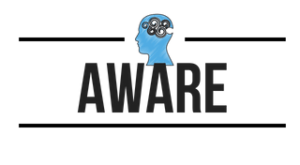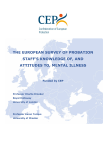 European Penitentiary
European Penitentiary Training Academies Network

Guidelines released by the Council of Europe in November 2019 recommend prison staff and probation practitioners receive basic training which raises awareness of the mental health needs of convicted persons, including information on sources of wider supports. This session uses fresh data from a pan-EU survey from the Erasmus+ AWARE project to explore the training needs of new and existing prison and probation staff to effectively support clients with mental health needs, and goes on to look at how institutions can in turn support the staff to be aware of their own wellbeing.
In 2019 (prior to the pandemic), across five EU Member states, 100 inmates and 100 people who work with them were asked to detail their perceptions and procedures in mental health care, to inform about ‘what works’ in training provision and work out what might be transferrable. AWARE respondents identified gaps in their procedural knowledge (such as, does a probation psychologist know how an inmate is assessed for mental health issues on arrival in prison?) and practical training (as a prison or probation officer, how should I act if a client has their first mental health crisis on my watch?). They also validated what inmates feel is crucial to their mental wellbeing in prison.
Some of what was learnt within the project supported fundamental recommendations, such as those from the Council of Europe. Some findings were new and can be used to improve practice: the majority of staff thought that inmates would automatically turn to a colleague when depressed or upset. However, 83% of inmates said they would first turn to family or partner, with a third adding that they do not actually have the opportunity to keep this contact up. Staff from different agencies dealing with the same clients had been trained to interpret and implement policy in different – even conflicting – ways. The survey data helped to identify, assess and work out possible solutions to each of these challenges.
The AWARE Mental Health Handbook was built on what was already know with the input from all stakeholders and creates a shared single vision of wellbeing in of prisoners and of staff in prison. It is free to use and available in five languages and is written by practitioners who understand the possible lack of resources in our justice systems so offer effective, basic mental health interventions that can be delivered cost-effectively to the benefit of staff and clients.
Each of the AWARE respondents felt they had – or had developed for themselves – some skills to manage people with complex needs in a challenging environment, but also felt prison and probation staff must be given more opportunities to regularly develop their skills in updated training as new research becomes available. Awareness-raising was identified as knowing when and how to start conversations, between colleagues, with inmates or with people from another institution working with the same clients. The AWARE project developed accessible infographics in five languages to download and print from www.aware-project.org, and collated awareness-raising material from other relevant professional settings. A comprehensive glossary was also developed so that staff needing clarification of mental health in the justice setting would have a one-stop-shop.
Survey respondents across a variety of professions who work with convicted clients with mental health needs identified this aspect of their work as a particular trigger for their own stress, and noted their own need to learn to manage this stress. Consequently, as the project progressed, AWARE collected good practice on whole-prison wellbeing can be promoted through training, resulting in the resilience and retention of valued professionals. This collection of good practice, too, has been collated in the AWARE Handbook and shared online on www.aware-project.org.
| Funder | Erasmus + | ||||||
| Names(s) of coordinator | Rhianon Williams | ||||||
| Coordination agency | Federal State of Bremen Ministry of Justice and Constitution, Germany | ||||||
| Telephone Number (inc. Country Code) | Rhianon.williams@justiz.bremen.de 0049 176 81124009 |
||||||
| Partners in AWARE |
|


Our values


Supported by the Justice Programme of the European Union